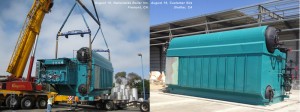Last week the White House announced an executive order supporting Combined Heat & Power (CHP) and industrial energy efficiency. The order calls for a national combined heat and power deployment goal of an additional 40 GW by 2020.
CHP systems can reach efficiencies above eighty percent (80%) and currently supply twelve percent (12%) of U.S. energy capacity. There is approximately 82 GW of CHP installed in the U.S. and industry estimates indicate the technical potential for additional CHP at existing sites in the U.S. is approximately 130 GW (plus an additional 10 GW of waste heat recovery CHP).
Investments in industrial energy efficiency, including combined heat and power, offer significant benefits to manufacturers, utilities and communities across the country, including:
- Manufacturers could save at least $100 billion in energy costs over the next decade, improving U.S. manufacturing competitiveness.
- Meeting the 2020 goal could mean $40 to $80 billion of new capital investment in American manufacturing facilities and helps to create jobs.
- Offering a low-cost approach to new electricity generation capacity to meet current and future demand: Investments in IEE, including CHP, cost as much as 50% less than traditional forms of delivered new baseload power.
- Significantly lowers emissions: Improved efficiency can reduce nationwide GHG emissions and other criteria pollutants.
USCHPA Executive Director, Jessica Bridges, said "CHP technology can be deployed quickly, cost-effectively and with few geographic restrictions. Establishing this national goal toward greater CHP deployment will significantly advance cleaner energy generation in the U.S., benefit the environment, and help create much-needed manufacturing and industrial jobs. I applaud the White House for its efforts to support clean power generation through CHP and pledge the combined heat and power industry's support to help achieve this goal."
USCHPA is a trade association whose membership includes manufacturers, suppliers, and developers of combined heat and power (CHP) systems. CHP lowers demand on the electricity delivery system, reduces reliance on traditional energy supplies, makes businesses more competitive by lowering their energy costs, reduces greenhouse gas and criteria pollutant emissions, and refocuses infrastructure investments toward next-generation energy systems. CHP is a proven and effective energy resource that can be immediately deployed to help address current and future global energy needs by incorporating commercially available and domestically produced technology. For more information, visit www.uschpa.org.
In support of the Executive Order, the Department of Energy and the Environmental Protection Agency released a new report Combined Heat and Power: A Clean Energy Solution that provides a foundation for national discussions on effective ways to achieve 40 GW of new, cost-effective CHP by 2020, and includes an overview of the key issues currently impacting CHP deployment and the factors that need to be considered by stakeholders involved in the dialogue.



